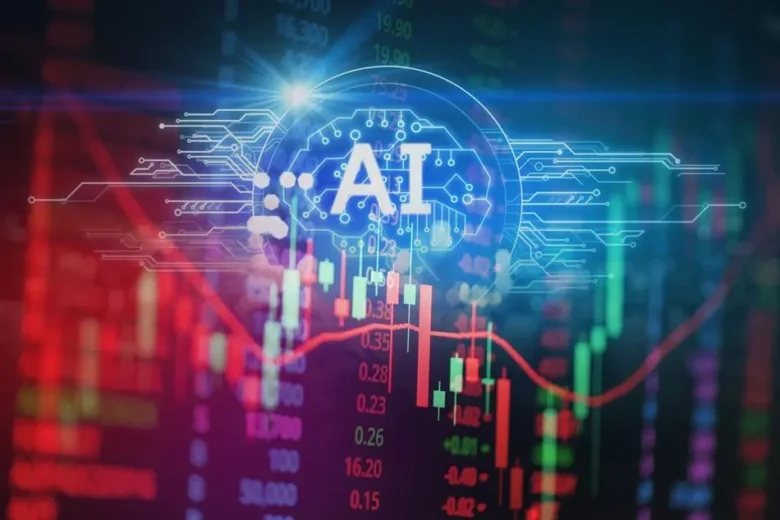Artificial intelligence (AI) is shaking up the financial markets and already transforming sectors like healthcare and transportation. Every investor wants to know if AI can predict stock market trends and consistently capitalize on them. This technology offers enormous potential for analyzing vast amounts of market data and discovering patterns that humans overlook, but the reality is far more complex than many realize.
Even the most advanced AI systems struggle to cope with stock market volatility, which is caused by numerous unexpected factors, including geopolitical events and economic developments. Investors must understand both the potential and limitations of AI for stock market forecasting to successfully deploy it. This detailed review assesses the performance and shortcomings of AI in financial forecasting and outlines realistic expectations for using it for stock market forecasting.
AI Financial Forecasting:
AI has revolutionized market analysis and investment decisions for financial institutions. Modern AI systems can process vast amounts of market data in real time, including stock prices, trading volumes, economic indicators, news sentiment, and social media trends that can influence market behavior. These systems use complex algorithms to discover correlations and patterns invisible to analysts. BlackRock, Goldman Sachs, and JPMorgan Chase have invested billions of dollars in AI trading platforms that can execute thousands of trades per second based on algorithmic predictions. This program can quickly analyze historical price trends, earnings data, and market indicators to generate trading signals. AI-driven financial forecasts depend on data quality, algorithm complexity, and market context.
Predictive Analysis and History:
AI stock forecasts are based on historical data analysis. Machine learning models are trained with decades of market data to identify patterns and trends. These systems analyze past stock performance based on price, volume, seasonality, and cyclicality. AI algorithms can determine that certain stocks outperform in certain quarters, react more predictably to earnings reports, or track specific technical indicators.
Renaissance Technologies, one of the most successful AI hedge funds, reportedly achieved a 30% annual return using mathematical models based on historical market data. The limitation of historical analysis is that past success does not guarantee future results. New circumstances, market conditions, and unexpected events can invalidate past trends. The 2008 financial crisis and the COVID-19 pandemic have demonstrated that unusual events can make even the most sophisticated historical forecasting models unpredictable.
Using Machine Learning to Predict Stocks:
Modern AI systems for stock forecasting utilize machine learning algorithms, each with its advantages and disadvantages. Neural networks, particularly deep learning models, can uncover complex, nonlinear market relationships that statistical methods lack. These algorithms can make predictions by analyzing technical indicators, fundamental indicators, market sentiment, and macroeconomic factors. Random forest algorithms and support vector machines can be used to classify stocks by period.
Artificial intelligence systems can improve their trading strategies based on market input through reinforcement learning, a learning method inspired by human trial and error. Natural language processing algorithms analyze news, earnings call transcripts, and social media to assess market sentiment and price trends. Despite these advanced methods, machine learning models used for stock forecasting still face challenges, such as overfitting to historical data, adapting to changing market conditions, and financial market noise that can obscure predictive signals.
Issues with AI Stock Forecasting:
AI stock forecasting faces several potential problems that make it difficult to accurately predict. According to the theory of market efficiency, stock prices already represent all available information, making future predictions difficult. Economists believe that “noise,” such as investor sentiment, geopolitical events, natural disasters, and rapid economic changes, can obscure predictive signals in the stock market. AI models are also subject to the non-stationary nature of financial markets, requiring frequent model updates and retraining.
Overfitting, a common issue, occurs when AI systems excessively concentrate on past data patterns, preventing them from adapting to novel market conditions. Lack of data, bias, or latency can all lead to prediction errors. As AI trading systems become more widely deployed, competing algorithms could reduce the effectiveness of older prediction methods and exacerbate market volatility.
Ethics and Regulation:
The financial industry continues to face ethical and legal issues related to the use of AI for stock market prediction. AI systems can unfairly favor technologically advanced institutions over ordinary investors, raising concerns about market manipulation. AI-driven high-frequency trading can lead to market instability and sudden crashes, as demonstrated by the sudden crash of 2010. The U.S. Securities and Exchange Commission and other regulators are introducing transparency and risk management requirements for algorithmic trading to address these issues.
AI trading systems must not become “black boxes” that their designers cannot understand or manage, so transparency standards are being considered. The concentration of AI trading power in the hands of a few large institutions raises concerns about market concentration and systemic risk. To maintain fair and efficient markets for all participants, AI systems must be carefully assessed and monitored to prevent them from perpetuating or exacerbating market distortions.
Future Trends in Stock Market Analysis and AI:
AI stock market forecasting requires more complex systems that utilize a wide range of data sources and analysis methods. Quantum computing could increase AI’s processing power, enabling more complex market models that can handle exponentially more variables. To gain market insights, AI predictive models use satellite imagery to analyze economic activity, credit card transaction patterns, and internet search trends. As researchers develop systems that can provide explanations for their predictions, the importance of explaining AI is growing.
Enhanced edge computing and real-time processing can accelerate market reactions. Combining human experience with machine intelligence, leveraging AI’s pattern recognition capabilities while retaining human oversight of strategic decisions, holds enormous promise. More investors are interested in sustainable investing, which is pushing AI models to include environmental, social, and governance factors, creating a new aspect in stock prediction algorithms.
The True Potential of AI in the Stock Market:
AI can help analyze financial markets, but it cannot predict market movements. The technology can evaluate vast amounts of data, discover patterns, and execute trades with superhuman speed, offering real advantages to investors who understand its strengths and weaknesses. To cope with unusual market conditions, AI stock forecasting requires reasonable expectations, rigorous risk management, regular model adjustments, and human oversight. AI cannot eliminate risk and uncertainty in the stock market, but when used effectively, it can improve decision-making and investment results.
More advanced AI technologies may emerge in the future to complement human investment judgment. Investors considering AI should understand the technology’s advantages and disadvantages, diversify their investment approach, and be wary of any system that promises to predict the market. AI solutions that enhance human decision-making, rather than replace it, are likely to be effective in the stock market.
FAQs:
1. Does AI guarantee success in stock trading?
No, AI cannot guarantee success in stock trading. While AI systems are advanced and can enhance analytical and decision-making capabilities, the stock market’s volatility and the many uncontrollable factors make losses inevitable.
2. How reliable are AI stock forecasts?
The model, data quality, market environment, and timeframe significantly influence the accuracy of AI stock forecasts. Most professional AI trading algorithms have an accuracy of 50-60%, which is better than random guessing, but not perfect.
3. Do major investment firms use AI for stock trading?
Most major investment firms use AI for trading. BlackRock, Goldman Sachs, and Renaissance Technologies have made significant investments in AI market analysis, risk management, and automated trading systems.
4. What data do AI systems analyze for stock forecasting?
AI systems analyze historical price data, trading volumes, earnings reports, economic indicators, news sentiment, social media trends, satellite imagery, credit card transactions, and internet search patterns.
5. Should retail investors use AI when selecting stocks?
AI should empower individual investors, not replace the core philosophy of investing. While AI can help with analysis, investing still requires diversification, risk management, and realistic market returns.




